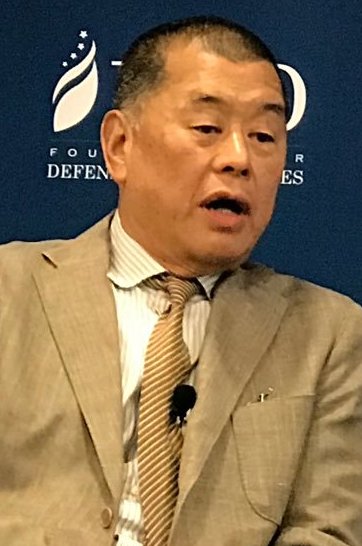by Brian Hioe
語言:
English
Photo Credit: Studio Incendo/WikiCommons/CC
THE ARRESTS OF Hong Kong media tycoon Jimmy Lai, Labor Party vice-chairman Lee Cheuk-yan, and former Democratic Party chair Yeung Sum yesterday represent continued attempts by the Hong Kong government to crack down on political dissidents. The three were arrested by Hong Kong police at their homes yesterday morning. Though all three were later released on bail, though it is probable that the Hong Kong government will seek to jail the three down the line.
Lai, Lee, and Yeung were arrested on charges related to an August 31st protest march from last year. Lai and Lee were arrested on charges of participating in an illegal assembly, while Yeung was arrested on charges of having helped organize an illegal assembly. Lai also faces charges of threatening an Oriental Daily reporter on June 4th, 2017 at the annual Tiananmen Square commemoration in Hong Kong, though many describe this as exchanging insults more than anything else. The Oriental Daily is viewed as a pro-Beijing newspaper.
 Jimmy Lai. Photo credit: VOA/Public Domain
Jimmy Lai. Photo credit: VOA/Public Domain
The Civil Human Rights Front (CHRF), the primary organizer of the largest protests which have taken place during the past year of protests in Hong Kong—including marches which drew over one million and two million individuals—originally called for a protest march on August 31st. However, after police revoked the approval for this march, the CHRF called on individuals to instead shout protest slogans wherever they were at 8:31 PM.
A police crackdown on leading figures of the demonstrations took place on August 30th. Joshua Wong and Agnes Chow of Demosisto, Andy Chan of the Hong Kong National Party, Jimmy Sham of the Civil Human Rights Front, organizer Max Chung, Cheng Chung-tai, lawmaker and the chair of Civic Passion, former Hong Kong University student union president Althea Suen, pan-Democratic lawmakers Au Nok-him and Jeremy Tam, and Sha Tin district councilor Rick Hui.
The police ban did not prevent hundreds of thousands of demonstrating in defiance of the ban in Wan Chai. In the course of demonstrations, Molotov cocktails were thrown near LegCo, and fires started by demonstrators outside of the Wan Chai police headquarters.
However, particularly controversial was the use of armored police water cannon vehicles for the first time, as well as police violence within the Prince Edward MRT station and other MRT stations, including the Yau Ma Tei station. Police are accused of having possibly killed protestors during the violence that ensued but having covered this up. Accusations that deaths occurred during the police dispersion operation have led to memorials being set up outside the Prince Edward MRT intermittently during the past months of demonstrations.
Of the three arrests, the arrest of Lai has received the most attention in particular. Jimmy Lai, who was originally born in China and lived there until age 13 but made his fortune in Hong Kong, is the founder of the clothing retail brand Giordano and the owner of the Apple Daily. The Apple Daily, a tabloid newspaper that also has a Taiwan edition, is a major pro-democracy media outlet in Hong Kong, though the Taiwan edition of the newspaper is no longer owned by Lai. Lai, whose net worth has been estimated at over 1 billion USD in the past, is also a major contributor to pan-Democratic political parties such as the Democratic Party.
It is thought that Lai’s arrest is meant to send a warning to media outlets in Hong Kong. Indeed, although Lai has faced legal charges before, it is to be seen as to whether this will have a chilling effect on media in Hong Kong.
 Central Government Headquarters in Hong Kong. Photo credit: Wpcpey/WikiCommons/CC
Central Government Headquarters in Hong Kong. Photo credit: Wpcpey/WikiCommons/CC
The arrests of Lai, Lee, and Yeung took place on the 73rd anniversary of the 228 Massacre in Taiwan, the date traditionally viewed as the beginning of the White Terror period, which lasted in Taiwan for decades afterward. Notably, the silencing of political dissidence in Hong Kong, with the use of arrests and brutal force against protestors, has been referred to as a “White Terror.”
The three arrests also take place the same week as the sentencing of Causeway Bay bookseller Gui Minhai in China to ten years in jail on charges of espionage. The kidnapped Causeway Bay booksellers were a group of five employees of Causeway Bay Books, a bookstore in Hong Kong which sold and published titles critical of the Chinese government.
Efforts by the Hong Kong government to crack down on political dissidence continue, then, despite the city facing shortages as a result of the COVID-19 epidemic. The Hong Kong government has, in fact, been accused of using public attention on the COVID-19 epidemic as cover to carry out its political crackdown.

